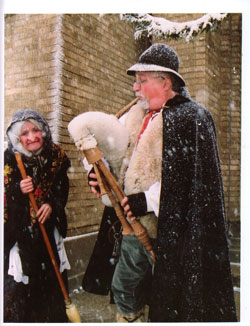 Go back in your Italian ancestry — back beyond your childhood and those of your parents and grandparents. Go back to a time before Italy, before the Roman Empire, even. Now, imagine some ancient Etruscan mystic fashioning a goddess invoked in a magic spell to chase away bad luck. She is probably some 2,700 years old.
Go back in your Italian ancestry — back beyond your childhood and those of your parents and grandparents. Go back to a time before Italy, before the Roman Empire, even. Now, imagine some ancient Etruscan mystic fashioning a goddess invoked in a magic spell to chase away bad luck. She is probably some 2,700 years old.
No wonder she shows her age today.
We know this ancient, benevolent presence today as La Befana, Italy’s good Christmas witch. And a pair of Fra Noi veterans who’ve contributed to our magazine since the 1980s now keep her memory alive: Lionel Bottari and Jean Parisi.
During the year, these two remarkable artists do plenty to raise the spirits of those around them. Lionel is a clown and puppeteer, Jean a longtime arts advocate in the Pilsen neighborhood. And they’re both practitioners of com media dell’arte, which itself dates back to the 1600s.
But come Christmastime, the two transform themselves into living theater with roots deeper than Christianity itself. Parisi appears across the Chicago area as La Befana, with candy to stuff in the shoes of boys and girls: “You can picture an elderly woman with gray hair, a witch nose and a big handmade broom,” she says. “She’s sprightly, funny and a generous grandmother.” And Bottari accompanies her as her trusty zompognaro, an Italian bagpipe player dressed in sheepskins.
They’ve been doing this now for almost 20 years, but no one knows exactly how far back these characters go. (La Befana certainly isn’t spilling the beans.)
“The legend is known all over Italy, and it seems to be exclusively Italian,” says Bottari. “She visits around Jan. 6, the Epiphany. That’s a name that sounds a lot like Befana.”
Was it possible this ancient presence once had her own celebration? Bottari thinks so: “The Catholic Church was good at co-opting ancient holidays and turning them into Christian ones.”
Here’s how the story goes: On their way to see the Christ child, the Three Kings stop at La Befana’s house. “She’s a widow, and in some legends she left her husband and child because of the plague,” Bottari says. “She’s so upset about this that she compulsively sweeps the house with her broom.”
The Wise Men ask her to come along. La Befana declines, but as the star heralding Jesus’ birth glows, she feels regret. Suddenly her broom morphs into a flying stick, and she’s off to circle the world, rewarding kids everywhere in hopes that one is the elusive Christ child.
“If children leave their shoes out, she leaves candy in them,” Parisi says. “And if you’re bad, you get coal. There’s actually a licorice candy that looks like coal.”
Bottari traces his roots on both sides to Lucca in Tuscany (a name itself derived from “Etruscan”), yet he never heard about La Befana growing up. Neither did Parisi, who has Calabrian lineage on her father’s side.
“We have to give credit to Paula D’Angelo,” Parisi says. “She was at Our Lady of Pompeii Church and must’ve remembered the story from her childhood.” She started acting it out two decades ago, “and somehow she turned it over to me.”
If not for Jean Parisi’s small act of understudy brio, it’s possible this ancient tale of transcendent love would be lost to Chicagoans forever.
Now, you can count on Parisi and Bottari visiting places like the Shrine of our Lady of Pompeii, LaSalle Language Academy, Casa Italia, and local holiday gatherings to pass it on.
 Fra Noi Embrace Your Inner Italian
Fra Noi Embrace Your Inner Italian





